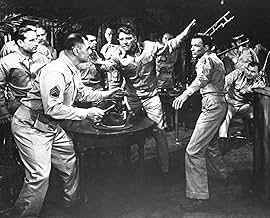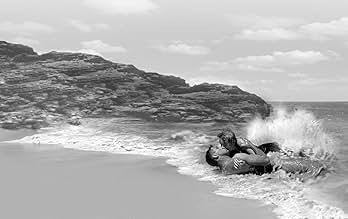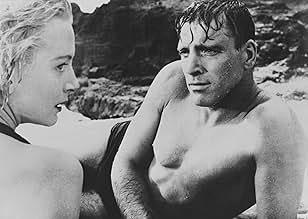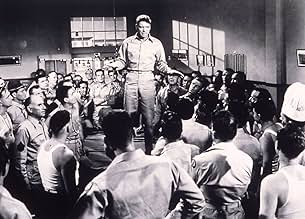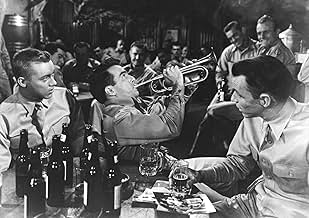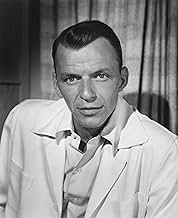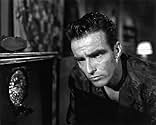En Hawái en 1941, varios dramas sociales acontecen en el pelotón del recién llegado Robert Prewitt que parecerán minucias cuando Pearl Harbor sea inesperadamente atacado.En Hawái en 1941, varios dramas sociales acontecen en el pelotón del recién llegado Robert Prewitt que parecerán minucias cuando Pearl Harbor sea inesperadamente atacado.En Hawái en 1941, varios dramas sociales acontecen en el pelotón del recién llegado Robert Prewitt que parecerán minucias cuando Pearl Harbor sea inesperadamente atacado.
- Dirección
- Guionistas
- Elenco
- Ganó 8 premios Óscar
- 26 premios ganados y 9 nominaciones en total
Claude Akins
- Sgt. 'Baldy' Dhom
- (sin créditos)
Vicki Bakken
- Suzanne
- (sin créditos)
Margaret Barstow
- Roxanne
- (sin créditos)
- Dirección
- Guionistas
- Todo el elenco y el equipo
- Producción, taquilla y más en IMDbPro
Opiniones destacadas
In hindsight, this 1953 classic doesn't seem as much a military drama as it does a highly charged soap opera, which shouldn't come as a surprise given that master filmmaker Fred Zinnemann ("the Nun's Story") was at the helm. The veteran director upended the western genre just a year earlier with the Gary Cooper classic "High Noon", and he places the same incendiary focus of character over action here, that is, until the inevitable climax which uses the Japanese attack on Pearl Harbor as a catharsis for the characters' dilemmas now dwarfed by the coming world war.
Based on James Jones' epic novel, screenwriter Daniel Taradash manages to reduce the complexity of the book's themes without trivializing them, and then-offbeat casting enhances the movie immeasurably. Set on a U.S. Army base in Hawaii in the months leading up to the attack, the focus is on two men, both dedicated to the military with no aspirations to become the officers they have grown to detest. One is Private Robert E. Prewitt, a talented boxer (and bugler) who refuses to fight on his regiment's team since blinding a sparring partner. The other is First Sergeant Milton Warden, a take-charge, professional soldier who earns the trust of his men even as he kowtows to his weak-willed commanding officer.
Life in the barracks is fraught with adversarial personalities, chief among them Private Angelo Maggio, Prewitt's loudmouthed best friend, and Staff Sergeant "Fatso" Judson, the sadistic stockade warden. Both Prewitt and Warden meet women who seek to change their lives. Prewitt finds cynical nightclub "hostess" Lorene at a brothel masquerading as a social club, while Warden embarks on a passionate affair with his commanding officer's wayward wife Karen. Burt Lancaster is well cast as Warden, and he brings surprising nuance to his character's clandestine encounters with Karen. However, it's Montgomery Clift - despite looking too slight to be genuinely believable as a boxer - who transcends his loner role by playing off his innately sensitive nature to portray a man who will never sacrifice his honor despite how dire the consequences. Well within his comfort zone, Frank Sinatra's turn as Maggio is small but impactful.
Still two years away from "Marty", Ernest Borgnine makes Judson's malevolence palpable in just a few scenes. Deborah Kerr submerges her Scottish accent and previous lady-like demeanor to reveal the embittered, sexually assertive side of Karen without sacrificing any of the character's vulnerability. The legendary, much-parodied beach scene with Lancaster still sizzles after all these years. Similarly, Donna Reed foregoes her good-girl image (epitomized by her memorable turn as Mary Bailey in "It's a Wonderful Life") to play the sultry, delusional Lorene. The 2003 DVD comes with a small set of extras - a three-minute making-of retrospective short, a nine-minute collection of on-set footage and interviews from a documentary entitled "Fred Zinnemann: As I See It", and the original theatrical trailer. The best extra is the commentary track from Tim Zinnemann (the director's son) and screenwriter Alvin Sargent ("Spider-Man 2"), who had a small role in the movie.
Based on James Jones' epic novel, screenwriter Daniel Taradash manages to reduce the complexity of the book's themes without trivializing them, and then-offbeat casting enhances the movie immeasurably. Set on a U.S. Army base in Hawaii in the months leading up to the attack, the focus is on two men, both dedicated to the military with no aspirations to become the officers they have grown to detest. One is Private Robert E. Prewitt, a talented boxer (and bugler) who refuses to fight on his regiment's team since blinding a sparring partner. The other is First Sergeant Milton Warden, a take-charge, professional soldier who earns the trust of his men even as he kowtows to his weak-willed commanding officer.
Life in the barracks is fraught with adversarial personalities, chief among them Private Angelo Maggio, Prewitt's loudmouthed best friend, and Staff Sergeant "Fatso" Judson, the sadistic stockade warden. Both Prewitt and Warden meet women who seek to change their lives. Prewitt finds cynical nightclub "hostess" Lorene at a brothel masquerading as a social club, while Warden embarks on a passionate affair with his commanding officer's wayward wife Karen. Burt Lancaster is well cast as Warden, and he brings surprising nuance to his character's clandestine encounters with Karen. However, it's Montgomery Clift - despite looking too slight to be genuinely believable as a boxer - who transcends his loner role by playing off his innately sensitive nature to portray a man who will never sacrifice his honor despite how dire the consequences. Well within his comfort zone, Frank Sinatra's turn as Maggio is small but impactful.
Still two years away from "Marty", Ernest Borgnine makes Judson's malevolence palpable in just a few scenes. Deborah Kerr submerges her Scottish accent and previous lady-like demeanor to reveal the embittered, sexually assertive side of Karen without sacrificing any of the character's vulnerability. The legendary, much-parodied beach scene with Lancaster still sizzles after all these years. Similarly, Donna Reed foregoes her good-girl image (epitomized by her memorable turn as Mary Bailey in "It's a Wonderful Life") to play the sultry, delusional Lorene. The 2003 DVD comes with a small set of extras - a three-minute making-of retrospective short, a nine-minute collection of on-set footage and interviews from a documentary entitled "Fred Zinnemann: As I See It", and the original theatrical trailer. The best extra is the commentary track from Tim Zinnemann (the director's son) and screenwriter Alvin Sargent ("Spider-Man 2"), who had a small role in the movie.
Classic 50's Hollywood feature documenting the lives and times of the US Army personnel in Hawaii leading up to the Japanese air attack on the Pearl Harbour naval base which precipitated the US entry into the second world war. Shot in black and white by Fred Zinnemann to emphasise the war-time setting, the drama is peopled with convincingly realistic characters with a credible, episodic narrative edging ever closer to the pivotal date of December 7th.
Multiple plot lines are skilfully interwoven until their climactic convergence at the end aided by top acting from a superb cast. The dramatic thread to the film is Montgomery Clift's Prewett character and his relationships with the characters played by Burt Lancaster, the firm but fair sergeant himself drawn into a sexually charged relationship with his superior officer captain's disaffected wife, played against type by Deborah Kerr, Donna Reed as the "hostess" he falls in love with and especially Frank Sinatra's rascally but likeable and always supportive Maggio.
Sinatra famously begged for the chance to show his acting skill in a straight role to reignite his career and duly given the chance, he grabs it with both hands. Lancaster and Kerr fire up the screen in their doomed relationship, especially in the famous scene by the crashing waves, Reed plays her part with admirable restraint but Clift's acting exceeds them all, whether in his reluctant fight scenes, blowing a bugle like Satchmo or playing a drunk after he's exacted revenge on Maggio's tormentor, played memorably by the recently deceased Ernst Borgnine.
The action climax as the Japanese attack is thrillingly portrayed especially the high camera shots, although I would question the too obvious and thus jarring insertion of real footage of the actual attack.
Controversial in its day for its unblinkingly honest depiction of the US army, it can be seen now as one of the best films of the 50's, a master class in dramatic narrative and character acting.
Multiple plot lines are skilfully interwoven until their climactic convergence at the end aided by top acting from a superb cast. The dramatic thread to the film is Montgomery Clift's Prewett character and his relationships with the characters played by Burt Lancaster, the firm but fair sergeant himself drawn into a sexually charged relationship with his superior officer captain's disaffected wife, played against type by Deborah Kerr, Donna Reed as the "hostess" he falls in love with and especially Frank Sinatra's rascally but likeable and always supportive Maggio.
Sinatra famously begged for the chance to show his acting skill in a straight role to reignite his career and duly given the chance, he grabs it with both hands. Lancaster and Kerr fire up the screen in their doomed relationship, especially in the famous scene by the crashing waves, Reed plays her part with admirable restraint but Clift's acting exceeds them all, whether in his reluctant fight scenes, blowing a bugle like Satchmo or playing a drunk after he's exacted revenge on Maggio's tormentor, played memorably by the recently deceased Ernst Borgnine.
The action climax as the Japanese attack is thrillingly portrayed especially the high camera shots, although I would question the too obvious and thus jarring insertion of real footage of the actual attack.
Controversial in its day for its unblinkingly honest depiction of the US army, it can be seen now as one of the best films of the 50's, a master class in dramatic narrative and character acting.
... from what we feed on these days and perhaps only of relevance as an artefact of the time it was released and the period it reflects, the way we behave and interact in the real world has changed unrecognisably since. It does, however, deliver us some top drawer performances from some genuinely talented performers, most of them to go on to much bigger and better things. All in all, a solid 1950s era film set in the prior decade before the outbreak of war, it uses multiple and interlinked sub plots to show us the sorrow and sadness experienced by numerous characters as a result of the choices they've made, the people they met and how they interacted.
1941. Private `Prew' Prewitt has been transferred to Hawaii. His new captain is keen to get promoted and sees Prew's former boxing prowess as his way to get noticed. However Prew has given up boxing and refuses to join the team leading the Captain to punish him in many different ways. Meanwhile Sergeant Warden is beginning an affair with the Captains maltreated wife. Prew himself finds a girl but his friend Maggio has conflict with Sergeant Judson. Meanwhile the threat of attack looms.
This is most famous for Warden and Holmes' adulterous passion as the waves lash over them. Probably people who haven't seen the film will still know that scene. However this film is much more than that. The plot has several main strands mostly involving romance running through it. It works well but it is really a soapy melodrama at the end of it all. This doesn't mean it's not enjoyable and intense but it is really that basic. The Pearl Harbour attack is tacked onto the end and didn't really grab me.
The central relationships are OK but the film is strongest in some very good male performances. Clift is great as the put upon private, while Lancaster deserves recognition for more than just snogging Kerr on a beach. Kerr and Reed are OK Kerr is better but none of the female roles are as good as the male leads. Warden, Sinatra and Borgnine are all great support and steal the show when they are on screen (Sinatra especially).
Overall I was surprised to see this film being hailed so high in many polls. I found it to be involving, interesting and well acted but at it's core it is a melodrama that has a few bangs at the end. Worth a watch.
This is most famous for Warden and Holmes' adulterous passion as the waves lash over them. Probably people who haven't seen the film will still know that scene. However this film is much more than that. The plot has several main strands mostly involving romance running through it. It works well but it is really a soapy melodrama at the end of it all. This doesn't mean it's not enjoyable and intense but it is really that basic. The Pearl Harbour attack is tacked onto the end and didn't really grab me.
The central relationships are OK but the film is strongest in some very good male performances. Clift is great as the put upon private, while Lancaster deserves recognition for more than just snogging Kerr on a beach. Kerr and Reed are OK Kerr is better but none of the female roles are as good as the male leads. Warden, Sinatra and Borgnine are all great support and steal the show when they are on screen (Sinatra especially).
Overall I was surprised to see this film being hailed so high in many polls. I found it to be involving, interesting and well acted but at it's core it is a melodrama that has a few bangs at the end. Worth a watch.
James Jone's novel was deemed impossible to put onto the screen {how many times have we heard that one before?}, but nobody told director Fred Zinnerman and the cast of dreams. Troubles with the making of the film were many, the film was thwarted by a censorship requirement that the army not be portrayed as careless and over brutal, and some of the sexual themes from the novel had to be toned down. Zinneman also had to fight a continuous battle with Columbia's head ego tripper Harry Cohn. He interfered with every script that was shown to him, and casting was also a tough thing to achieve with Cohn trying to call the shots. As it turned out we got one of the best composition of actors in one film to have ever graced the screen.
From Here To Eternity is a film about the lives and loves of a number of characters at Schofield Barracks-Pearl Harbor, just prior to the infamous attack by the Japanese that changed WW2. Illicit affairs, friendship, nobility, bravery and cruelty come crashing together in one gigantic lavish production that defines the word classic. Burt Lancaster, Montgomery Clift, Frank Sinatra, Ernest Borgnine, Jack Warden, Deborah Kerr, and Donna Reed all give performances that any other actor would be proud to have given. On another day they all could have won awards such was the strength of performance they all gave. Reed & Sinatra won best supporting Oscars, while Fred Zinneman rightly won for best director to cement the film winning outright for best picture. Yet the film's crowning glory didn't win an award, for to me, Montogomery Clift gives one of the best performances in motion picture history, it's layered to perfection and it's one of those character portrayals that has me involved to the point of exhaustion. One scene in which he plays a bugle lament as tears roll down his face is just stunning, and I know how he feels because I cry along with him to, such is my involvement with his turn as Robert E. Lee Prewitt.
Laced with memorable scenes {the kiss, the bugle lament, Lancaster blasting away at the Japanese planes with machine gun in hand}, and performances to match, From Here To Eternity is essential cinema to be viewed every year and homaged and praised whenever possible. 10/10 in every single respect.
From Here To Eternity is a film about the lives and loves of a number of characters at Schofield Barracks-Pearl Harbor, just prior to the infamous attack by the Japanese that changed WW2. Illicit affairs, friendship, nobility, bravery and cruelty come crashing together in one gigantic lavish production that defines the word classic. Burt Lancaster, Montgomery Clift, Frank Sinatra, Ernest Borgnine, Jack Warden, Deborah Kerr, and Donna Reed all give performances that any other actor would be proud to have given. On another day they all could have won awards such was the strength of performance they all gave. Reed & Sinatra won best supporting Oscars, while Fred Zinneman rightly won for best director to cement the film winning outright for best picture. Yet the film's crowning glory didn't win an award, for to me, Montogomery Clift gives one of the best performances in motion picture history, it's layered to perfection and it's one of those character portrayals that has me involved to the point of exhaustion. One scene in which he plays a bugle lament as tears roll down his face is just stunning, and I know how he feels because I cry along with him to, such is my involvement with his turn as Robert E. Lee Prewitt.
Laced with memorable scenes {the kiss, the bugle lament, Lancaster blasting away at the Japanese planes with machine gun in hand}, and performances to match, From Here To Eternity is essential cinema to be viewed every year and homaged and praised whenever possible. 10/10 in every single respect.
Oscars Best Picture Winners, Ranked
Oscars Best Picture Winners, Ranked
See the complete list of Oscars Best Picture winners, ranked by IMDb ratings.
¿Sabías que…?
- TriviaMontgomery Clift threw himself into the character of Prewitt, learning to play the bugle (even though he knew he'd be dubbed) and taking boxing lessons. Fred Zinnemann said, "Clift forced the other actors to be much better than they really were. That's the only way I can put it. He got performances from the other actors, he got reactions from the other actors that were totally genuine."
- ErroresThe impromptu bugle solo in the club includes notes that only a trumpet could hit.
- Citas
Robert E. Lee "Prew' Prewitt: Nobody ever lies about being lonely.
- Créditos curiososOpening credits prologue: SCHOFIELD BARRACKS HAWAII 1941
- ConexionesEdited from December 7th (1943)
- Bandas sonorasRe-enlistment Blues
(1953)
by James Jones, Fred Karger, Robert Wells
Sung by men in the barracks twice
Played often in the score
Selecciones populares
Inicia sesión para calificar y agrega a la lista de videos para obtener recomendaciones personalizadas
- How long is From Here to Eternity?Con tecnología de Alexa
- Is 'From Here to Eternity' based on a book?
Detalles
- Fecha de lanzamiento
- País de origen
- Idioma
- También se conoce como
- From Here to Eternity
- Locaciones de filmación
- Halona Beach Cove, O'ahu, Hawái, Estados Unidos(Warden and Karen's kissing in the surf scene)
- Productora
- Ver más créditos de la compañía en IMDbPro
Taquilla
- Presupuesto
- USD 1,650,000 (estimado)
- Total en EE. UU. y Canadá
- USD 36,416
- Fin de semana de estreno en EE. UU. y Canadá
- USD 18,176
- 7 dic 2003
- Total a nivel mundial
- USD 36,416
- Tiempo de ejecución1 hora 58 minutos
- Color
- Mezcla de sonido
- Relación de aspecto
- 1.37 : 1
Contribuir a esta página
Sugiere una edición o agrega el contenido que falta

Principales brechas de datos
By what name was De aquí a la eternidad (1953) officially released in India in Hindi?
Responda


